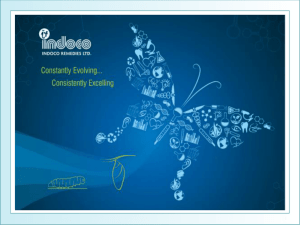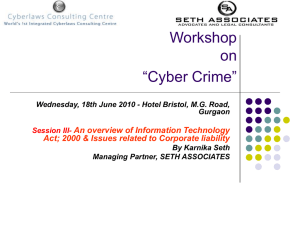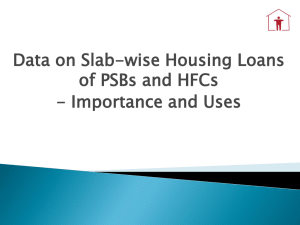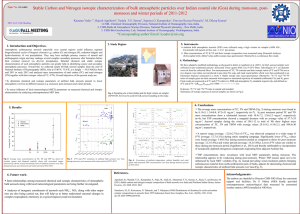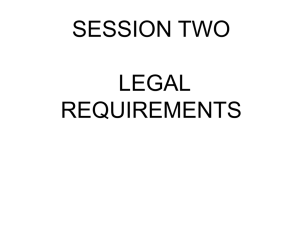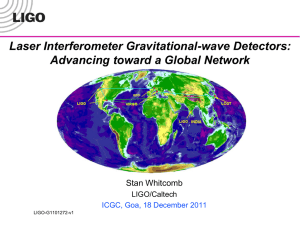Section 43 nullcon Goa 2010
advertisement
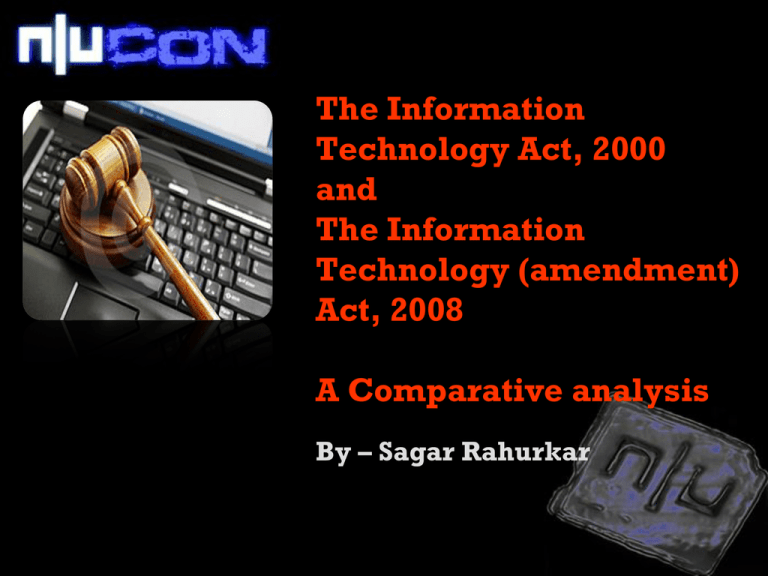
The Information Technology Act, 2000 and The Information Technology (amendment) Act, 2008 A Comparative analysis By – Sagar Rahurkar Birth of Cyber Laws The United Nations General Assembly have adopted the Model Law on Electronic Commerce on 30th January 1997. It is referred to as the “UNCITRAL Model Law on E-Commerce”. nullcon Goa 2010 http://nullcon.net Birth of Cyber Laws India passed the Information Technology Act, 2000 on 17th October, 2000. Amended on 27th October 2009. Amended Act is known as The Information Technology (amendment) Act, 2008. nullcon Goa 2010 http://nullcon.net Also amended Indian Penal Code nullcon Goa 2010 Indian Evidence Act http://nullcon.net Bankers' Books Evidence Act Electronic authentication The IT Act, 2000 specified “digital signatures” as the means of electronic authentication. This approach was not a technology neutral approach and the law was bound by a specific technology. nullcon Goa 2010 http://nullcon.net Electronic authentication The IT Act, 2008 introduces the concept of “electronic signatures” in addition to digital signatures. Electronic signatures is the wider term covering digital signatures, biometric authentication, etc. It has a technology neutral approach and not bound by any specific technology. nullcon Goa 2010 http://nullcon.net Types of electronic signatures Passwords, personal identification numbers (PINs) i.e. based on the knowledge of the user. nullcon Goa 2010 http://nullcon.net Types of electronic signatures Biometric authentication i.e. method based on the physical features or personal trait of the user nullcon Goa 2010 http://nullcon.net Types of electronic signatures Scanned handwritten signatures. Signature by means of a digital pen. “OK” or “I accept” boxes. Secure Sockets Layer (SSL) certificates. nullcon Goa 2010 http://nullcon.net Civil Provisions Section 43 - Unauthorised Access U/ the IT Act, 2008 no limit on amount of compensation for offences under Section 43 U/ the IT Act , 2000 it was Rs. 1 Crore nullcon Goa 2010 http://nullcon.net Section 43 Provides assistance to facilitate illegal access Disrupts computer or network Charges the services availed of by a person to the account of another person If any person without permission of the owner or incharge of a computer - Downloads, copies or extracts data Introduces computer contaminant or virus Damages computer nullcon Goa 2010 Accesses or secures access to a computer http://nullcon.net Civil Provisions Section 43(A) – new provision Corporate bodies handling sensitive personal information in a computer resource are under an obligation to ensure adoption of reasonable security practices to maintain its secrecy. nullcon Goa 2010 http://nullcon.net Civil Provisions Even mobile companies to respect privacy of customers u/ Sec. 43(A).(Rutuja Tawade v/s Vodafone) Nadeem Kashmiri’s case (credit card fraud) Liability on call centers, BPOs nullcon Goa 2010 http://nullcon.net Adjudication of Civil offences Under the IT Act, 2008 the “Adjudicating Officers” to try cases where the claim is upto Rs. 5 crore. Above that the case will have to be filed before the “Civil Courts”. Under the IT Act, 2000 civil courts did not have jurisdiction to try civil suits. nullcon Goa 2010 http://nullcon.net Criminal Provisions Section 66 Provision has been significantly changed. Under IT Act, 2008 all the acts referred under section 43, are also covered u/Sec. 66 if they are done “dishonestly” or “fraudulently”. Many cybercrimes on which there were no express provisions made in the IT Act, 2000 are now included in the IT Act, 2008. nullcon Goa 2010 http://nullcon.net Section 66(A) Sending of offensive or false messages - new provision Also known as “Cyber Stalking” Covers sending of menacing, offensive or false messages via SMS/EMAIL/MMS Punishment – imprisonment upto 3 years and fine nullcon Goa 2010 http://nullcon.net Section 66(B) Dishonestly receiving stolen computer resource or communication device - new provision Also covers use of stolen Computers, mobile phones, SIM Cards, etc Punishment – imprisonment upto 3 years or fine upto Rs. 1 lakh or both nullcon Goa 2010 http://nullcon.net Section 66(C) Identity theft - new provision Fraudulently or dishonestly using someone else’s electronic signature, password or any other unique identification feature Punishment - imprisonment upto 3 years and fine upto Rs. 1 lakh nullcon Goa 2010 http://nullcon.net Section 66(D) Cheating by personation - new provision Cheating by pretending to be some other person Punishment – imprisonment upto 3 years and fine upto Rs. 1 lakh nullcon Goa 2010 http://nullcon.net Section 66(E) Violation of privacy - new provision Popularly known as Voyeurism Pune spy cam incident where a 58-year old man was arrested for installing spy cameras in his house to ‘snoop’ on his young lady tenants Covers acts like hiding cameras in changing rooms, hotel rooms, etc Punishment –imprisonment upto 3 years or fine upto Rs. 2 lakh or both nullcon Goa 2010 http://nullcon.net Section 66(F) Cyber terrorism - new provision Whoever uses cyberspace with intent to threaten the unity, integrity, security or sovereignty of India or to strike terror in the people Punishment - Imprisonment which may extent to life imprisonment nullcon Goa 2010 http://nullcon.net Cyber Pornography Section 67 - Publishing or transmitting obscene material in electronic form Punishment – First instance - imprisonment upto 3 years and fine upto Rs. 5 lakh. Subsequent - imprisonment upto 5 years and fine upto Rs. 10 lakh. nullcon Goa 2010 http://nullcon.net Cyber Pornography Section 67(A) – new provision Publishing or transmitting sexually explicit acts in the electronic form Similarity with Sec. 292 IPC Punishment – First instance - imprisonment upto 5 years Subsequent - imprisonment upto 7 years Fine upto Rs. 10 lakh. nullcon Goa 2010 http://nullcon.net Child Pornography Section 67(B) – new provision Creating, collecting, browsing, downloading, etc of Child Pornography Punishment – First instance - imprisonment upto 5 years. Subsequent - imprisonment upto 7 years Fine upto Rs. 10 lakh. nullcon Goa 2010 http://nullcon.net Preservation of information by intermediaries Section 67(C) – new provision Intermediary shall preserve and retain such information as may be specified for such duration and in such manner and format as the Central Government may prescribe. nullcon Goa 2010 http://nullcon.net Government’s power to intercept Section 69 – new provision Government to intercept, monitor or decrypt any information generated through any computer resource if it thinks to do so in the interest of the sovereignty or integrity of India. nullcon Goa 2010 http://nullcon.net Government’s power to intercept Punishment for refusing to hand over passwords to an authorized official of the Central or State Government Punishment – imprisonment upto 7 years and fine nullcon Goa 2010 http://nullcon.net Liability of Intermediary not to disclose any personal information Section 72(A) - new provision Intermediary to act as per the terms of its lawful contract and not beyond it. Punishment – imprisonment upto 3 years or fine upto 5 lakh or both nullcon Goa 2010 http://nullcon.net Liability of Intermediary Section 79 An intermediary not to be liable for any third party information, data, or communication link made available or hosted by him. nullcon Goa 2010 http://nullcon.net Liability of Intermediary Intermediary need to prove that he didn’t – Initiate the transmission, Select the receiver of the transmission, and Select or modify the information contained in the transmission and The intermediary observes due diligence while discharging his duties under the Act. nullcon Goa 2010 http://nullcon.net Abetment Section 84(B) – new provision Abetting to commit an offence is punishable Punishment – Same punishment provided for the offence under the Act nullcon Goa 2010 http://nullcon.net Attempt Section 84(C) – new provision Attempt to commit an offence is punishable Punishment – Imprisonment which may extend to one-half of the longest term of imprisonment provided for that offence nullcon Goa 2010 http://nullcon.net Investigation Powers Section 78 – new provision As per the IT Act, 2008 Cyber crime cases can be investigated by the “Inspector” rank police officers. U/ the IT Act, 2000 such powers were with the “DYSP/ACP”. nullcon Goa 2010 http://nullcon.net Compounding of Offences Section 77 (A) – new provision Compounding – “Out of court settlement” Offences “for which less than three years imprisonment has been provided” can be compounded. nullcon Goa 2010 http://nullcon.net Compounding of Offences Such offence should not affect the socio economic conditions of the country or has been committed against a child below the age of 18 years or a woman. nullcon Goa 2010 http://nullcon.net nullcon Goa 2010 http://nullcon.net •Email: sr@asianlaws.org •Website: www.asianlaws.org

